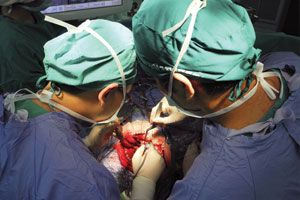IT is time to “grasp the nettle” and introduce specialised centres for surgical management of pancreatic cancer in Australasia, according to surgeons in the field.
The call comes after a study reporting outcomes of surgery for pancreatic cancer in Victoria, published in the latest MJA, showed a large number of surgeons had each performed only a modest number of resections. (1)
The research found that in the 2-year study period 133 laparotomies were performed for attempted Whipple resection in the state. In the 98 cases for which the surgeon’s identity was known, three surgeons performed nine or more such laparotomies, seven surgeons performed four to eight, and 21 surgeons had performed less than four.
“We found that a relatively large number of surgeons each performed a modest number of Whipple resections during the 2-year study period, but early mortality and survival were not related to surgeon workload”, the researchers wrote.
They found Victoria’s 30-day mortality rate for the procedure (5.3%) was lower than the reported rates in most epidemiological studies in other countries (7.5% in the US and 12% in England and Wales).
The study’s lead author, Dr Antony Speer, told MJA InSight that these were good results and in line with the 30-day mortality rates of high-volume hospitals overseas. “The data say that even with lots of surgeons, we are doing as well as anyone overseas, but we should always look for ways to improve”, he said.
However, not all the outcomes were as positive, according to an accompanying editorial by Dr Robert Padbury, director of surgery at Flinders Medical Centre. (2)
“The rate of positive margins was nearly 40%, and 90-day mortality was 9.3%. Of 133 patients explored with intent to resect, 58 did not proceed. While benchmarking indicators is an inexact science, these figures would suggest room for improvement”, Dr Padbury wrote.
In contrast, there was considerable evidence that concentrating complex procedures such as pancreatectomy in specialised centres lead to significant outcome improvement, he wrote.
“Western Australia has responded to the evidence of inferior outcomes with widely distributed procedures by limiting pancreatectomy to three hospitals.
“Considering all these factors, the moment has arrived to grasp the nettle of specialised centres in Australasia. It is not just about surgical mortality, but providing better care to patients with pancreatic cancer and contributing to the research effort and knowledge base for this lethal condition”, Dr Padbury wrote.
Dr Nicholas O’Rourke, a Brisbane-based surgeon and president of Australian and New Zealand Hepatic, Pancreatic & Biliary Association, said he was surprised at the high number of Victorian surgeons doing Whipple resections.
He said pancreatic cancer patients tended to do better in specialised high-volume centres where surgeons were more experienced and multidisciplinary team-based care was provided before, during and after the surgery.
Surgeons were increasingly opting to send patients to high-volume centres. “In Queensland, there is a real reluctance by surgeons in provincial hospitals to take these cases on in case they run into trouble”, he said.
However, the downside of the high-volume approach was that it down-skilled surgeons who weren’t in these centres. He said provincial hospitals could still attain good results provided they had the right multidisciplinary team in place.
– Amanda Bryan
1. MJA 2012; 196: 511-515
2. MJA 2012; 196: 490
Posted 7 May 2012

 more_vert
more_vert
Pancreatic cancer should be performed in specialised centres by upper GI surgeons with a special interest and experience in this most demanding of procedures. The first Whipple I did was on a 17 year old lad that had ruptured the head of his pancreas in a car accident. His pancreatic duct, of course was narrow and difficult to anastomose but he survived. Unfortunately I did not have enough cases to maintain skills in spite of using post-mortem material for practice. My results, I am sure, would not be as good as those you quote. Yet I did have one lady with a confirmed carcinoma of the head of the pancreas who survived over 14 years! I am pleased that one of my surgical registrars has become specialised in this area.